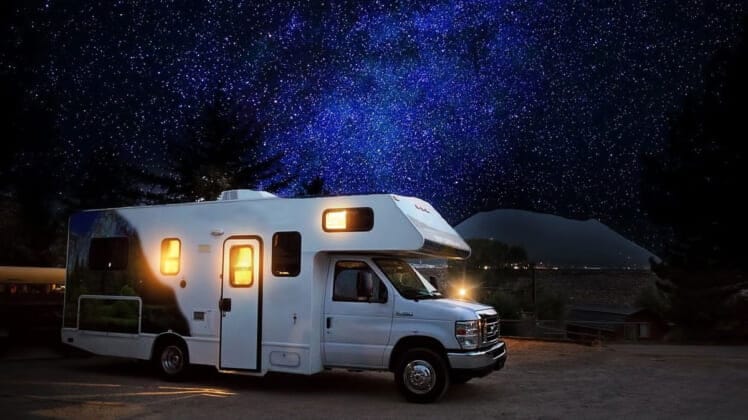
When buying a used RV or motorhome you have to remember that you’re not just buying a vehicle – you’re buying what will be a vacation home on wheels.
By following these 7 simple steps you’ll be able to dodge any RVs and motorhomes from hell.
1. Set yourself a budget
- Money plays a vital role when buying a used RV or motorhome.
- If you begin your search for an RV or motorhome with no budget in mind, you will almost definitely overspend. So before setting out looking at vehicles, always set a strict budget.
- To determine your budget, perhaps consider how often you go on vacation or go camping. If you don’t yearn for the great outdoors and an RV lifestyle, then it doesn’t make sense to spend a massive amount of money on something you will use once every few years. Therefore, set your budget around how often you’ll be using the RV or motorhome.
- The best thing about setting a smart budget is that you’ll instantly narrow down your vehicle search.
Also Read: The 10 most common RV and motorhome problems you should know before buying
2. Carefully inspect the ceiling and roof
- If there are any visible signs of leaks, brown spots, or water damage on the ceiling, then buying that particular RV or motorhome is not worth the expense.
- Plus, refrain from wasting your money if the ceiling is bowed or coming down.
- Also, check the roof by pressing it (some even walk on it). Be certain about its sturdiness and stability.
- A critical feature of a good roof is correctly sealed caulking. Moldy caulk or old blackened crumbling caulk could be a sign that water is seeping in and damaging the vehicle.
3. Inspect the floor closely
- Once you’ve checked the top, it’s time to check that the floors meet the walls properly.
- Although it may sound funny, the best way to check proper flooring is to jump on it, especially around the bathroom and kitchen area.
- An ideal floor should be firm and sturdy.
- Buying a used RV or motorhome can offer more value for money, but if you’re finding a lot of dampness it may indicate rotting. At that point, you’re looking at a potential money pit.
4. Watch out for signs of mold
- Even if you don’t find any visible signs of water damage or spills on the floors or ceilings, mold, especially in the interior, can be enough proof to skip that particular RV/motorhome.
- Mold is a sign of leakage and likely leads to a structural water-related problem. It might be a cheap fix, or it could run you up thousands. Unless you have a trusted expert on the scene, you’re better off skipping every RV and motorhome that has even a hint of mold.
- Check the ceilings, floors, walls, corners, and caulk in the bathroom and around the fixtures. Use a flashlight and check in the cabinets and closets too.
- Mold has an unmistakable odor, so don’t just look, smell the RV/motorhome. Plus, if you notice over-powering scents, be warned. That seller might be trying to mask the smell of mold.
Also Read: 10 amazing family-friendly RVs and motorhomes
5. Check the wheels
- We’ll say it again. Always check the wheels.
- You want to check tire pressure, tire walls, tire tread, tire date of manufacture, wheel rims, brake rotor surface, brake pads, brake function, spare tire, lug nut torque, etc.
- Literally, check everything because the wheel and wheel arch can hide a multitude of sins when buying a used RV or motorhome.
6. Check the RV’s history
- When buying a used RV or motorhome know that you are taking a risk. The more reputable the source, the more you reduced that risk.
- This is why it is imperative that you purchase the RV, motorhome, or any vehicle for that matter, from a dealer and not an individual. Individuals won’t give a warranty.
- Yet, if you do find an amazing deal from an individual, make sure that person is the owner.
- Plus, always get the maintenance records of the vehicle. No records should mean no sale. Maintenance records are like the holy grail of buying a used RV or motorhome. It gives you all the necessary information regarding any significant leaks or any other historical issues.
- One pro tip is to ensure that the Vehicle Identification Number (VIN) of the RV/motorhome matches its paperwork.
7. Ask for a test drive
- If the owner doesn’t allow you to take a test drive before making the purchase, do not at any cost buy that RV or motorhome.
- When you do take it for a test drive, listen for any rattling or unpleasant sounds when the rig moves.
- Identify where the noises are coming from and ask yourself, is it structural or mechanical? If the fix is simply cosmetic, then continue the test drive.
- If possible, take the RV/motorhome up a hill and listen to the engine. Does it whine in protest or overheat?
- Simply put, anything beyond a cosmetic cheap fix should end the test drive and any deal you were planning to make.
Finally, know that buying a used RV or motorhome should be fun. The last thing you want is to resent the purchase from day 1.

